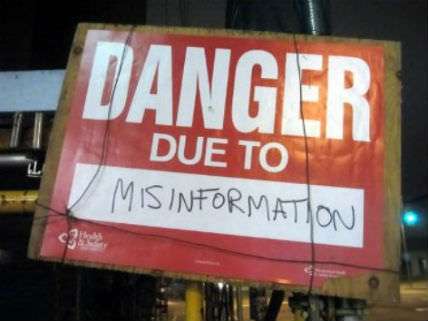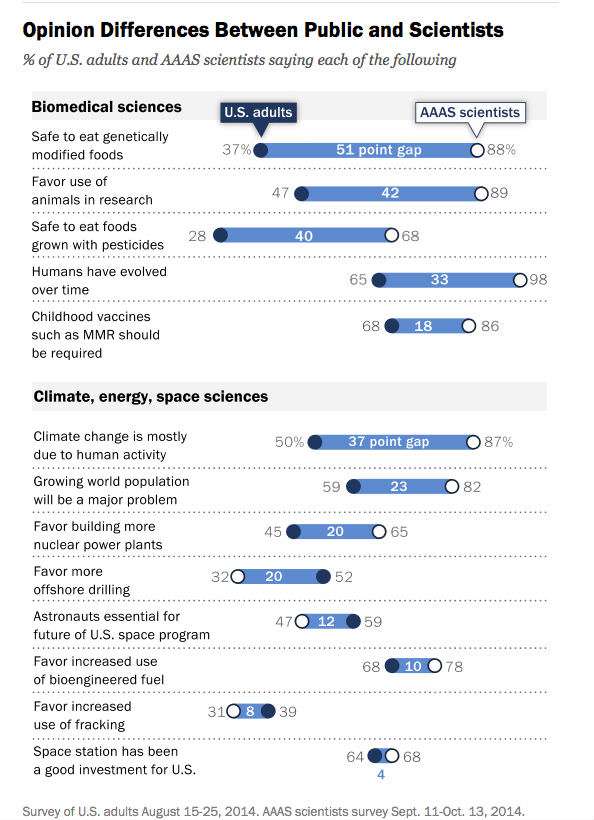Really Depressing Survey of What Scientists and the Public Think About Science and Society
Disinformation specialists are everywhere

The Pew Research Center released today its Public and Scientists' Views of Science and Society survey. Pew surveys a representative sample of Americans and members of the American Association for the Advancement of Science on a variety of issues at the nexus of science and public policy. The results make for fairly disheartening reading for all sorts of reasons. As Mark Lynas over at the Washington Post reports:
There is a 18 percentage point gap, for example, over whether parents should be required to vaccinate their children: 86 percent of scientists favor this, as compared to just 68 percent of the general public. There is a much larger gap on climate change: 87 percent of AAAS scientists say it is caused by human activity, compared to 50 percent of the public. Almost all scientists – 98 percent — say humans have evolved over time, while just 65 percent of the public thinks they have.
But for the general public, the strongest anti-science attitudes relate to genetically modified foods. Eighty-eight percent of AAAS scientists say it's safe to eat genetically modified food, compared to just 37 percent of U.S. adults. Such discrepancies do not happen by accident. In most cases, there are determined lobbies working to undermine public understanding of science: from anti-vaccine campaigners, to creationists, to climate-change deniers.
The problem is that disinformation specialists, uh, activists and lobbyists, eagerly engage in what Stephen Colbert might call "scienciness" to scare, uh, persuade people into adopting policies they are pushing for reasons of ideology or greed or both. In fact, I think that the Pew survey shows that both the public and scientists have been misled by disinformation on specific issues below.

So what's right? Biotech foods are safe to eat; research on animals to devise treatments for people is still necessary; trace exposures to chemicals, both natural and synthetic, are risk factors in 2 percent of cancers; humans evolved over time; the risk-benefit profile for childhood vaccines is massively in their favor; climate change is mostly due to human activity (which says nothing about policy); world population will top out and begin declining by the end of this century; nuclear power is safe and over-regulated; offshore drilling is safer than ever; astronauts are not essential to the U.S. space program; biofuels are an ecological and economic disaster; fracking is no more dangerous than other drilling technologies and provides access to lower-carbon natural gas; the space station is a waste of money.
Now that I've cleared up those controversies, I must express considerable disappointment with the responses of the AAAS scientists with respect to pesticides, offshore drilling, biofuels, and fracking.
Most people worry eating foods treated with pesticides largely because they fear getting cancer. But as the American Cancer Society itself reports:
Exposure to carcinogenic agents in occupational, community, and other settings is thought to account for a relatively small percentage of cancer deaths – about 4% from occupational exposures and 2% from environmental pollutants (man-made and naturally occurring).
Failing to eat enough fruits and vegetables daily is a far greater health risk than being exposed to parts per million or billion of current pesticides on your grocery store produce.
I suspect that the policy preferences of AAAS members concerning how to handle man-made climate change have skewed their views with regard to offshore drilling, biofuels, and fracking.
With the salient exception of the Macondo spill in the Gulf of Mexico, the Bureau of Ocean Energy Management reports that number of barrels spilled per barrels produced fell from 255,000 in the 1960s to 6,500 in the first decade of the 21st century.
The environmental think thank the World Resources Institute just released its report "Biofuels Are Not a Green Alternative to Fossil Fuels." The title speaks for itself and I hope AAAS members wiil read the WRI report before the next survey.
With regard to fracking, the Intergovernmental Panel on Climate Change's 2014 Mitigation report refers to burning natural gas to produce electricity as a "bridge technology" to the low and no-carbon energy future.


Show Comments (172)